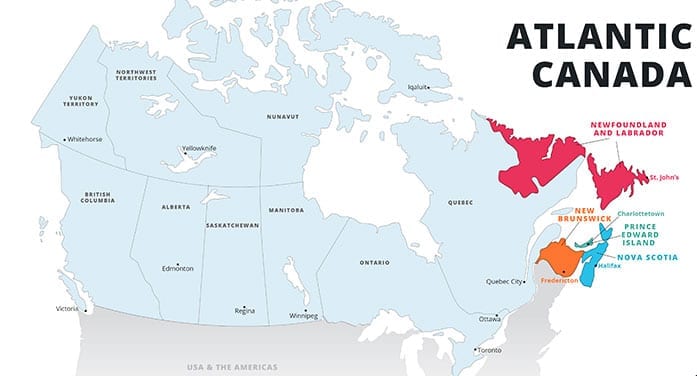 For many years, there has been debate about equalization and other transfer programs and their impact on Atlantic Canada and other regions. Much of this discussion has been technical and difficult to follow.
For many years, there has been debate about equalization and other transfer programs and their impact on Atlantic Canada and other regions. Much of this discussion has been technical and difficult to follow.
The debate has also been misleading because it focused on equalization even though equalization is only about a quarter of the net transfers to the region from other Canadians. Regional subsidies to Atlantic Canada are much larger than is commonly assumed.
Most Atlantic Canadians would be surprised to find that in recent years, the net annual transfer to each Atlantic Canadian from the pockets of other Canadians has been $6,400 or approximately $25,000 for a family of four, every year.
That’s a remarkable number, and it poses many problems that aren’t always evident.
The first of these is risk.
Extraordinary subsidies for each Atlantic Canadian come largely from taxpayers in Alberta and Ontario.
Concern in Alberta about the size of the transfer has grown rapidly in recent years as conditions in the energy industry deteriorated. A referendum on equalization is planned for October.
Ontario is now the largest non-sovereign borrower in the world and will borrow an additional $100 billion in the next five years, making the problem even worse.
Atlantic Canadians would be foolhardy if they didn’t recognize that taxpayers elsewhere who generate about 15 per cent of the region’s output can’t really afford to do so. Even the federal government – so far blind to the scale of the problem – may have to recognize this.
The second problem is more dangerous because it’s insidious. It’s the appearance of normalcy in the region.
As they go about their daily lives, Atlantic Canadians see new buildings being built in Halifax, Moncton and other cities. They see many new automobiles on the roads. Real estate markets in major centres are strong. Conditions appear to be like those found in the rest of Canada and the United States.
Substantial funding flowing into the region via the federal government disguises the reality that conditions aren’t like those found elsewhere. Atlantic Canada’s economy isn’t performing nearly as well as most other parts of the developed world. However, citizens are prevented from recognizing this by the artificial normalcy they see around them.
This may be the biggest problem of all. It makes Atlantic Canadians far too comfortable in relation to their real circumstances.
The third problem is what economists call moral hazard.
Massive and carelessly designed and delivered subsidies from other Canadians have enabled wildly excessive provincial public sectors in each Atlantic province.
A recent study demonstrated that Newfoundland’s current financial crisis is in significant measure attributable to an excessively large provincial public sector.
The university community in Nova Scotia is an example of excess. Nova Scotia has 10 universities while Ontario, with 15 times the population, has 23.
Virtually all public services – hospitals, community colleges, nursing homes – are more accessible in Nova Scotia, Prince Edward Island and New Brunswick than in Ontario.
The third problem is that the Atlantic Canada subsidy regime and subsidies to Quebec from 2007 to 2019 are major contributors to Canada’s debt problems.
A recent Fraser Institute study notes that the federal spending deficit in Quebec and the Atlantic provinces over this period was almost three times the size of the overall federal deficit over those years. The spending deficit in Atlantic Canada alone substantially exceeds the overall federal deficit over those years.
If federal revenues and expenditures in Atlantic Canada were balanced, the country would have had surpluses for many years and have entered the present financial crisis in a much stronger position.
The final problem with subsidies to Atlantic Canada is that they represent corrosive political practices that damage the region’s reputation and the national fabric.
Some years ago, the federal government made long-overdue changes to the Employment Insurance system, which resulted in Atlantic Canada abandoning the government for its temerity at the next election.
A recent premier of Newfoundland described his job as being to get into the pockets of other Canadians, via the federal government, as much as possible.
The federal government recently caved to local pressure by providing a lower price floor for the carbon tax to the Atlantic provinces, thereby impairing the program’s stated goal to reduce emissions.
These examples, and there are many more like them, demonstrate that Atlantic Canadians are using their overrepresentation in the House of Commons unwisely.
As these recent examples attest, voters in the region appear to be motivated more by their short-term financial interest than national purpose.
There are solutions to these problems. However, public opinion in Atlantic Canada has never supported implementing them because they’re challenging. If the present crisis does nothing else, it will result in more outside forces demanding change.
One hopes that this time the response will be different, leading to a more self-reliant region and a stronger Canada. This will only happen if new, better informed, and braver provincial and federal leaders emerge in Atlantic Canada.
David MacKinnon is a senior fellow at the Frontier Centre for Public Policy. A P.E.I. native, he was educated at Dalhousie and York universities. He worked in senior economic development roles in both the Nova Scotia and Ontario public services. He is also a former CEO of the Ontario Hospital Association.
David is one of our Thought Leaders. For interview requests, click here.
The views, opinions and positions expressed by columnists and contributors are the authors’ alone. They do not inherently or expressly reflect the views, opinions and/or positions of our publication.
© Troy Media
Troy Media is an editorial content provider to media outlets and its own hosted community news outlets across Canada.


